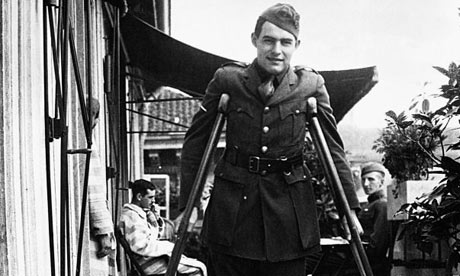Ernest Hemingway. He created a dazzling public persona for himself and mostly lived up to it. He seldom spoke of how deep his war wounds had gone and what psychic jackals stalked his later years…
Early and late in life, Hemingway was an extraordinary person. Even the first photographs, after those in baby clothes, reveal the unusual power he had of projecting himself. He looks straight at the camera, he smiles that warm smile of his, and his sisters- as late his companions in fishing or skiing- fade into the background; everyone fades except his big, smiling, square-faced mother, who had something of the same power. Perhaps his lifelong grudge against his mother was based on early rivalry, for Hemingway had a passionate desire to be first in everything. If he couldn’t be first in a sport, he abandoned it, as he abandoned football after his senior year at Oak Park High School, where he didn’t star on that year’s championship team; the prospect of having to play more football was one of the reasons he gave for not going to college. he had been first, however, in writing for the school paper, and writing was to be the trade he followed for the rest of his life.

—The Paris Review shares this image of a story about Ernest Hemingway, wounded on the Italian Front. The article follows the reminiscence of a soldier hospitalized next to Hemingway in the summer of 1918, and the experiences in the hospital may have crept into A Farewell to Arms.
“Hemingway was a good-looking son-of-a-gun, I thought, lying there fresh-faced and clean-shaven on the white-painted iron bedstead…he had a strong jaw and a wide boyish grin that revealed an even row of dazzling white teeth, and his jet black hair and dark eyes contrasted starkly with the snowy pillows that propped up his broad shoulders as he reclined at full length, one leg in a plaster cast, the other swathed in bandages.”
Read more at http://goodmenproject.com/good-feed-blog/today-in-literary-history-courtesy-the-paris-review-ernest-hemingway-wounded-on-the-italian-front/#Z5JauukDB1p1MO87.99
There are other early traits to be mentioned. Besides writing stories, he told them to his classmates as if they were adventures of his own. Sometimes they really were, but often they were more vivid and memorable than true. He had a weakness for boasting, usually with the self-deprecatory air that makes boasts more effective. He didn’t boast about his studious mind, but, in fact, he applied himself more diligently than his classmates to any subject that attracted his interests, and he learned almost anything with amazing speed. He was imaginative, enthusiastic, and persistent; also he had more energy than most boys of his age, a talent in itself, and perhaps he already required less sleep than they did.

— A man can be destroyed but not defeated.
– Ernest Hemingway
Fifty years ago, Ernest Hemingway, the writer, sportsman, big-game hunter, soldier, poseur, genius and Nobel Prize winner shot himself with his favourite Boss doublebarrel shotgun at his home in Ketchum, Idaho. His wife Mary at first pretended it was an accident, but nobody bought that fairy tale. He’d been suffering almost every imaginable physical and some mental problems, including writer’s block and, so it is said, impotence.
In previous months, he had submitted to more than 15 punishing ECT (electroshock convulsive) treatments at the Mayo clinic, due, in part, to his fear that the FBI was shadowing him. Paranoia? In fact, the FBI’s director J Edgar Hoover hated him as a “Communist” for raising money for ambulances to the antifascist loyalist side of the Spanish civil war and sheltering anti-Franco refugees.—Read More:http://www.guardian.co.uk/commentisfree/cifamerica/2011/jun/26/ernesthemingway-fbi
After being wounded in Italy, he was to spend many sleepless nights. That wound proved to be a decisive event in his career, and he was to make it an event in the lives of a whole generation of writers. It took place on the night of July 8, 1918, a month after he reached the Italian front in a Red Cross ambulance unit and two weeks before his nineteenth birthday. “There was one of those big noises you sometimes hear at the front,” Ernest told a friend much later. “I died then. I felt my soul or something coming right out of my body, like you’d pull a silk handkerchief out of a pocket by one corner. It flew around and then came back and went in again and I wasn’t dead anymore.” An ash can, as soldiers called them, fired by an Austrian mortar, had exploded beside him in a forward trench.Badly wounded as he was-later the surgeons counted 237 steel fragments in his legs- Ernest hoisted a still more badly wounded Italian onto his back and plodded off toward the dressing station. On the way he was wounded twice again, by slugs from a heavy machine gun, but somehow he reached the station before he collapsed. It was an exploit that won him the Italian silver cross.





 COMMENTS
COMMENTS